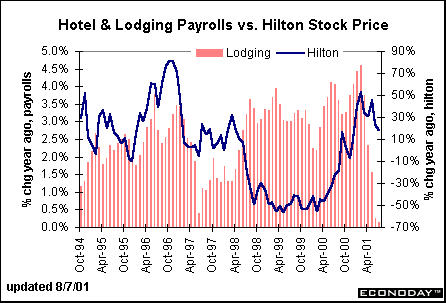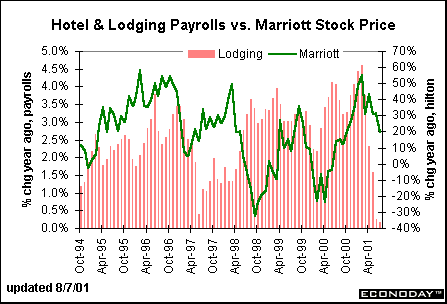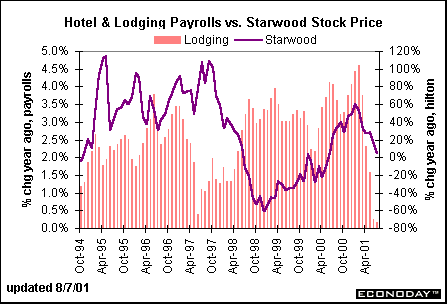Day traders follow economic indicators because any report that is different from expectations can cause swings in equity and bond prices. Long-term investors, relying on fundamental stock analysis, know that it's useful to follow current events because it sets the tone for the market and helps them determine the overall state of the economy. Nevertheless, it doesn't take long for an economic report to become old news - just another "so what." But there is another reason to follow economic indicators. It is a good idea to also understand a little about the company's industry or sector.
Let's suppose you believe that the leisure industry has good long-term fundamentals. After all, look at all those baby boomers who are nearing retirement age, growing more inclined to take vacations now that the kids' educations are paid down. Score one for the leisure industry. But vacation and business travel is also affected by the business cycle. That means that some sectors of the leisure industry might be negatively affected by an economic downturn.
Following the Peter Lynch principle of buying companies with which you are familiar, you consider Hilton Hotels. The chart below compares the year-over-year change in Hilton's stock price with the year-over-year change in employment in the hotel and lodging sector. The chart shows that the stock price was jumping on a year-over-year basis in the mid-1990s as was employment in this industry. Payrolls started to decline in early 1997 - as did the stock price. The sector was relatively sluggish during 1997, but began to pick up in 1998 until it peaked in late 2000. The stock price did begin to recover in 2000, but was quite negative during a good chunk of the growth years. Recently, hotel & lodging payrolls have been in a declining mode in 2001, as has Hilton's stock price on a year-over-year basis through July 31.

You might ask yourself whether hotel and lodging payrolls are a good indicator of hotel stock prices or not. One way to test that out is to compare additional companies with the movement in hotel employment. Going along with our premise that we should invest in what we know, let's look at Marriott International. The stock price of Marriott follows a similar pattern to Hilton's; however, Marriott didn't have the same negative pattern in the 1998-99 period. Also, looking at the scale on the right hand side of the charts you'll notice that Marriott's stock price didn't fall as much either.

We can look at one more hotel company. "Starwood Hotel and Resorts" may not be a household name, but they do operate household names such as Sheraton and Westin hotels. It appears that the stock price of Starwood Hotels and Resorts didn't weaken as much as Hilton and has posted better gains over the period. Yet a conclusion on which company will do best in the future is unclear. After all, even though Hilton's stock price wasn't as strong as the others during this time horizon, who's to say that a reversal isn't on the way and their growth rate potential isn't in fact stronger?

The bottom line? It's not a buy or sale recommendation! But individual investors do need to take a closer look at the wider economics that can affect company profitability and performance in the near and long terms. The economic cycle right now is negative for the leisure industry. But if you believe that we are poised for a recovery, then buying low (during an economic downturn) would be the best way to reap the benefits later on!
(Do you wonder how we chose these particular companies for analysis? They are listed in Business Week's corporate scoreboard as part of the hotel industry. Historical stock prices were readily available on AOL.)
Evelina M. Tainer, Chief Economist, Econoday
| 